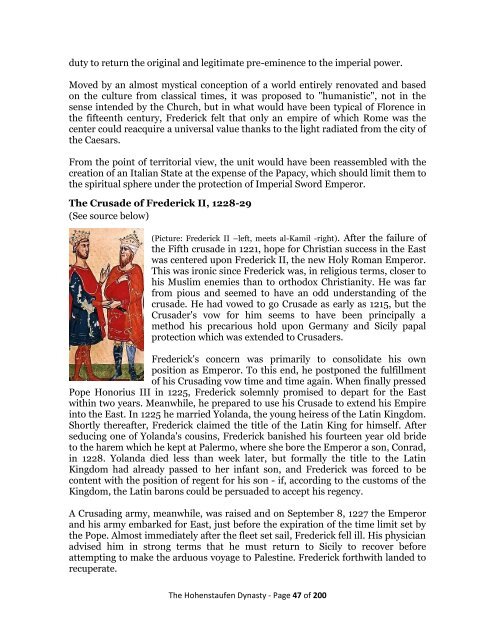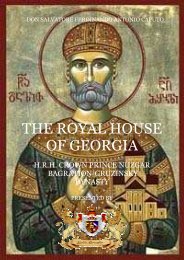here - Nobility Associations
here - Nobility Associations
here - Nobility Associations
Create successful ePaper yourself
Turn your PDF publications into a flip-book with our unique Google optimized e-Paper software.
duty to return the original and legitimate pre-eminence to the imperial power.<br />
Moved by an almost mystical conception of a world entirely renovated and based<br />
on the culture from classical times, it was proposed to "humanistic", not in the<br />
sense intended by the Church, but in what would have been typical of Florence in<br />
the fifteenth century, Frederick felt that only an empire of which Rome was the<br />
center could reacquire a universal value thanks to the light radiated from the city of<br />
the Caesars.<br />
From the point of territorial view, the unit would have been reassembled with the<br />
creation of an Italian State at the expense of the Papacy, which should limit them to<br />
the spiritual sp<strong>here</strong> under the protection of Imperial Sword Emperor.<br />
The Crusade of Frederick II, 1228-29<br />
(See source below)<br />
(Picture: Frederick II –left, meets al-Kamil -right). After the failure of<br />
the Fifth crusade in 1221, hope for Christian success in the East<br />
was centered upon Frederick II, the new Holy Roman Emperor.<br />
This was ironic since Frederick was, in religious terms, closer to<br />
his Muslim enemies than to orthodox Christianity. He was far<br />
from pious and seemed to have an odd understanding of the<br />
crusade. He had vowed to go Crusade as early as 1215, but the<br />
Crusader's vow for him seems to have been principally a<br />
method his precarious hold upon Germany and Sicily papal<br />
protection which was extended to Crusaders.<br />
Frederick's concern was primarily to consolidate his own<br />
position as Emperor. To this end, he postponed the fulfillment<br />
of his Crusading vow time and time again. When finally pressed<br />
Pope Honorius III in 1225, Frederick solemnly promised to depart for the East<br />
within two years. Meanwhile, he prepared to use his Crusade to extend his Empire<br />
into the East. In 1225 he married Yolanda, the young heiress of the Latin Kingdom.<br />
Shortly t<strong>here</strong>after, Frederick claimed the title of the Latin King for himself. After<br />
seducing one of Yolanda's cousins, Frederick banished his fourteen year old bride<br />
to the harem which he kept at Palermo, w<strong>here</strong> she bore the Emperor a son, Conrad,<br />
in 1228. Yolanda died less than week later, but formally the title to the Latin<br />
Kingdom had already passed to her infant son, and Frederick was forced to be<br />
content with the position of regent for his son if, according to the customs of the<br />
Kingdom, the Latin barons could be persuaded to accept his regency.<br />
A Crusading army, meanwhile, was raised and on September 8, 1227 the Emperor<br />
and his army embarked for East, just before the expiration of the time limit set by<br />
the Pope. Almost immediately after the fleet set sail, Frederick fell ill. His physician<br />
advised him in strong terms that he must return to Sicily to recover before<br />
attempting to make the arduous voyage to Palestine. Frederick forthwith landed to<br />
recuperate.<br />
The Hohenstaufen Dynasty - Page 47 of 200



